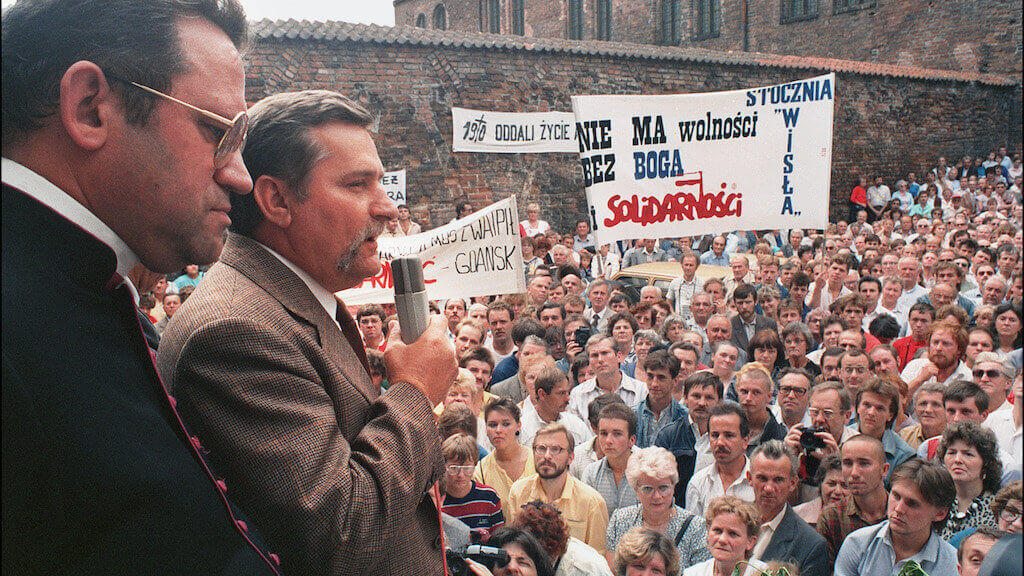“Nonetheless we will still need to react—and by that I mean react concretely—to the stunts of hooligan elements now active in Poland, whom the government has not taken any measures to combat. . . . What’s going on there now is they’re defacing the monuments of our soldiers . . . they’re insulting the Soviet Union in every possible manner . . . In other words, they’re mocking us,” Soviet Politburo member Nikolai Tikhonov exclaimed during a September 1981 debate over how to respond to the strikes and headline-grabbing protests by the Polish union, Solidarity.
Another Politburo member suggested using the media to smear the independent Polish union to win the public relations battle: “Both in ‘Pravda’ and in other newspapers we must organize statements of this sort.”
Another warned that the workers’ revolt might spread—thus challenging the legitimacy of a system that appropriated the industrial worker’s hammer crossed with the agricultural worker’s scythe. “Solidarity has decided not to confine itself solely to Poland. It is attempting to impose its subversive ideas on neighboring states and to interfere in their internal affairs.” He added a smear familiar to today’s ears, “This is just what fascists do in creating brigades of stormtroopers.”
The Soviet leaders faulted inadequate indoctrination decrying, “The lack of training in Marxist-Leninist sciences in secondary school is taking its toll. With regard to the mass media, their current status does not correspond to what is needed. The Party is taking steps to restore order and reestablish control. But even that will still leave things far from normal . . . Ideological erosion stemming from the decline of Party-educational work among the masses, and the neglect of this work in the mass media, define the current situation in Poland.”
Then, like now, academics and media were a tool of first resort to suppress and smear political opposition.
In September of 1981, the Soviet Union seemed an uncrackable monolith. On its frontiers stood a NATO force that would last only a few weeks were a conventional war to break out. The Soviets could rely upon apologists in Western academia and the media to amplify their propaganda and stifle voices demanding freedom. Yet the opposition of a labor union to Soviet Communism powerfully undermined its claim to legitimacy. The very symbol of that communism—the intersection of a hammer and sickle—implicitly claimed the entire Soviet system was just one large pro-worker’s union. We remember that Solidarity was the exception to the general rule that the central political authority controlled all unions in the Soviet Empire. We are reminded of that when we see modern American Unions paradoxically support open borders-style immigration and slavishly support the Democratic agenda.
In 1981, the future prime minister of Canada had not yet turned 10 years old and was not yet designated Canada’s “sexiest man alive.” Yet there are clues that Prime Minister Justin Trudeau might have heard and absorbed Soviet anti-Solidarity propaganda. In response to the 2022 truckers’ convoy, Trudeau plagiarized the Soviets, claiming, “We won’t give in to those who fly racist flags. We won’t cave to those who engage in vandalism or dishonour [sic] the memory of our veterans.”
The media, perhaps responding to a Soviet-style call to “organize statements of this sort,” wrote, “Images shared on social media during the weekend showed protesters waving flags with swastikas on them, as well as U.S. Confederate flags—which civil rights groups say is a symbol of white supremacy.”
Claims linking the Canadian truckers’ convoy to Nazis appeared in the Guardian, Vox, NPR, the Atlantic, BBC, the (ironically-named) Independent, NBC, Reuters, the Washington Post, the New York Times, and many more. Each of those 10 sources contains a line similar to this, “The truckers have been joined by various groups, including some displaying Nazi symbols and damaging public monuments.” None contained one picture or video to support the smear.
The smears remind us of the recent effort to associate the Republican candidate for governor in Virginia with fascists. In that incident, anti-Republican activists, including the Lincoln Project, donned costumes to pose as racist supporters of the candidate. We’re also reminded of the recent criminal conviction of Jussie Smollett for staging a fake hate crime to smear Trump supporters. We’re also reminded of the many successful lawsuits by Nick Sandmann who the media falsely accused of hate crimes. A more responsible media would have provided proof before coordinating yet another smear against a political movement.

In 1981, the Soviets seemed invincible. Yet their power was fragile, vulnerable to a single fissure of courage that started in Poland. That crack lengthened and spread until the entire system crumbled. It must have seemed impossible to defeat an ideology that controlled every institution—the press, the education system, the military, etc. Yet, without firing a shot, a courageous protest in Poland did just that.
The Soviet Union, like modern leftism today, appropriates and exploits the struggle of ordinary people while simultaneously making things worse for them. Their soft hands and arrogance set them apart from their supposed clients in the “real world.” Their only skill is to feast upon the fruits of other people’s labor. When real labor awakens to the true parasitic nature of the Left, the whole system comes crashing down.
No wonder they’re so afraid.
